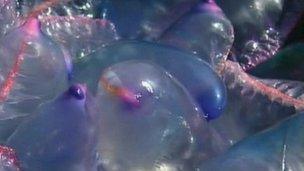Portuguese men of war spotted at Irish beaches
- Published

The deadly Portuguese men of war have been spotted on Irish beaches
Swimmers and surfers have been warned that Portuguese men-of-war whose sting can be deadly have been spotted on the Irish coast.
The men-of-war, which look like jellyfish, can cause severe pain and in rare cases, death.
The Irish Water Safety, external organisation issued a warning after they were seen on beaches in Waterford and Cork.
The IWC said they were spotted in Tramore, Ardmore, Inchydoney and Schull.
There is a risk that they may drift further north.
Portuguese men of war are about 30cm long and 13cm wide and it has tentacles that can reach 50m in length.
Each one is not a true jellyfish, but a floating colony of closely-related hydrozoans that normally live at the surface of the open ocean. The colony floats from the bottom of an air-filled float, and has many long thin tentacles hanging below that it uses to catch fish.
A sting may lead to an allergic reaction. There can also be serious effects, including fever, shock, and interference with heart and lung function. Stings may also cause death, although this is extremely rare.
The IWC said there had been an unprecedented number of sightings. It is understood that strong winds have blown them 350 miles further north than normal.
- Published12 August 2010